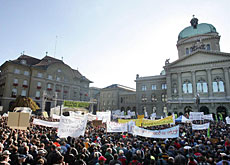Government sows seeds for farm deal

The cabinet says it wants to begin exploratory talks with the European Union on a free trade agreement for agriculture.
Also at its weekly meeting on Wednesday, the government said it does not want to alter its current relationship with the EU, which is based on a series of bilateral accords.
The decision to begin exploratory talks on agriculture with the EU comes less than six months after negotiations on a wide-ranging free trade accord with the United States broke down. Agriculture was the main stumbling block.
The cabinet now says it has been given the green light by all of the concerned parties to pursue talks.
In a statement, the cabinet said all tariff and non-tariff agricultural products and food industry goods would be on the table for discussion.
While the associations representing Swiss business interests said they were in favour of reaching a deal, Swiss farmers were more sceptical, demanding further clarifications while not ruling out initial bilateral talks. They also said their decision would be dependent on the outcome of the current round of World Trade Organisation talks, which are bogged down over agriculture.
As a next step, the government wants to investigate the possible repercussions of such a deal for the Swiss economy as a whole and for the industries directly affected. It said it would also look into measures that could soften any potential negative impacts.
Farmers fear a deal could lead to cheaper imports flooding the Swiss market and that it would jeopardise the generous subsidies they currently receive in the form of direct payments. They say the payments are needed to adhere to Switzerland’s complex agriculture regulations.
Swiss industry is in favour of liberalisation in order to free up more taxpayers’ money, and consumer groups believe a free trade accord would help bring down prices. The Swiss pay about 30 per cent more than their neighbours in Germany or France for many household items.
Europe 2006
The farming issue was also raised on Wednesday when Foreign Minister Micheline Calmy-Rey and Economics Minister Joseph Deiss presented a state-of-affairs paper, Europe 2006.
“Our ties with the EU shouldn’t always be overshadowed by the question, ‘do we belong or don’t we belong’,” said Calmy-Rey.
Calmy-Rey and Deiss said Switzerland, at least in the short- and medium-term, should concentrate on implementing the existing bilateral accords signed with the EU as efficiently as possible, and to begin negotiations on other sectors, such as agriculture, health and electricity.
The report analyses the effect Switzerland’s Europe policy has had on 20 key areas including direct democracy, federalism, the job market, finances, infrastructure and the economy.
All four parties represented in cabinet criticised the government’s position. The centre-right Christian Democrats and Radicals said it should have come out more strongly in support of the bilateral approach.
The pro-European, centre-left Social Democrats said the ministers could have been more courageous and taken the opportunity to launch a new debate on EU membership.
The anti-EU, rightwing Swiss People’s Party said it was convinced membership was still the ultimate goal of the cabinet and that Switzerland would pay dearly for each bilateral accord.
swissinfo with agencies
Switzerland is not a member of the European Union. In 1992 Swiss voters narrowly turned down the European Economic Area (EEA) or single market.
An application for EU membership has been lodged in Brussels but remains dormant.
Under the Swiss system of direct democracy, an application to join the EU would entail a national referendum, and a majority of voters and cantons in favour of joining.
Free movement of persons
Air and overland transport
Agriculture
Technical barriers to trade
Public procurement markets
Research
Cooperation in the fields of justice, police, asylum and migration (Schengen/Dublin)
Taxation of savings
Fight against fraud
Processed agricultural products
Environment
Statistics
Media
Education, occupational training, youth
Pensions

In compliance with the JTI standards
More: SWI swissinfo.ch certified by the Journalism Trust Initiative











You can find an overview of ongoing debates with our journalists here . Please join us!
If you want to start a conversation about a topic raised in this article or want to report factual errors, email us at english@swissinfo.ch.